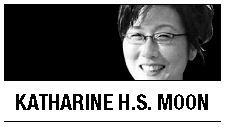NEW YORK ― Imagine North Korean leader Kim Jong-un in a tuxedo, waiting nervously at the altar (or shrine) of his grandfather, Kim Il-sung and his father, Kim Jong-il. He beholds his future wife’s face, anticipating his chance to kiss the bride. Of course, such an event can only be imagined in today’s North Korea. In the photographs presented to the world of the newly public couple, they stand chastely, but contentedly, next to each other but at an appropriate distance, or she follows a few steps behind.

While observers of North Korean affairs seem both tickled and stumped by Kim Jong-un’s marriage and the accompanying media snippets, this “new development” is not startling. It implies nothing about the young leader’s attitudes toward, say, political and economic reform; nor does it signify an effort to appeal to younger citizens for support. Instead, the true meaning of Kim’s marriage can be found in Korean tradition and dynastic practices.
For Koreans on both sides of the 38th parallel, marriage has long been a staple of social life. The Population Reference Bureau reports that in 2008, only 25 percent of North Korean women aged 25-29 ― and a mere 4 percent of women aged 30-34 ― had never been married. Among the Pyongyang elite, marriage is de rigueur, with 80 percent of the city’s adult residents registered as married. Indeed, a Korean must be married with children to be considered a true adult ― and that is no less true for North Korea’s First Couple.
According to the South Korean newspaper Hankyoreh Sinmun, the average North Korean man marries at age 29 and the average woman at 25.5. Thus, Kim Jong-un, who is purportedly 28 years old, got to the altar right on time.
Furthermore, women are the majority in North Korea’s capital. According to one recent defector, who lived among the elite before escaping to South Korea, more than 60 percent of Pyongyang’s residents are female. A woman’s face ― that of first lady Ri Sol-ju ― could therefore help to bolster support for the new regime.
Perhaps most important, marriage bestows on the young Kim social and, in turn, political legitimacy. Before the “Great Successor” was married, he looked like a young boy, sandwiched between generals, bureaucrats, and family members. Among his older, experienced colleagues, he resembled a lost puppy or a well-coached boy imitating a king, always in his predecessors’ shadow.
He was not Kim Jong-un, the new leader of North Korea, but a miniature version of “Great Leader” Kim Il-sung. And, since ascending to power after his father’s death last December, he has constantly been compared to the Kim dynasty’s progenitor. In fact, before he was “unveiled” to the North Korean public, Kim Jong-un is rumored to have been forced to undergo plastic surgery so that he would resemble his grandfather more closely.
In many Western societies, marriage, sex and children do not necessarily come in one package. But in Korean and dynastic cultures, they do ― like puzzle pieces forming a perfect familial picture.
If North Korea’s first couple already have a child, as South Korean intelligence experts believe, Kim Jong-un might be in better social and political shape than many predict. A child would prove his manhood and serve as his potential heir ― raising Kim’s status from boy king and “Great Successor” to legitimate leader responsible for grooming the dynasty’s next generation. If he is not yet a father, he undoubtedly is working on it, as progeny would decrease the risk that his half-brothers or other relatives might challenge his position.
Now Kim must show that he is a real family man, like his father and grandfather, each of whom had multiple wives and children. First lady Ri Sol-ju probably hopes to bear sons soon, to become “Supreme Wife and Mother” and to live a long and happy life ― with or without Kim. If she is smart, she knows that North Korea’s future, and therefore hers, is a precarious one. Keeping the government in a family of her own will help to secure her position, as well as that of her husband.
By Katharine H.S. Moon
Katharine H.S. Moon is a professor of political science at Wellesley College, where she is director of East Asian studies, and an associate fellow and member of the Policy Advisory Board at the Asia Society, New York. ― Ed.
(Project Syndicate)








